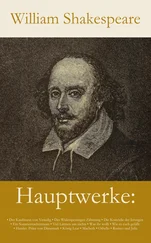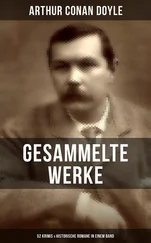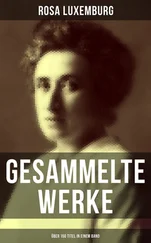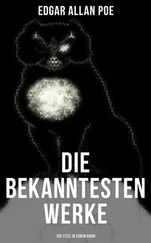Turn giddy, and be holp by backward turning;
One desperate grief cures with another’s languish:
Take thou some new infection to thy eye,
And the rank poison of the old will die.
ROMEO.
Your plantain-leaf is excellent for that.
BENVOLIO.
For what, I pray thee?
ROMEO.
For your broken shin.
BENVOLIO.
Why, Romeo, art thou mad?
ROMEO.
Not mad, but bound more than a madman is;
Shut up in prison, kept without my food,
Whipp’d and tormented and—God-den, good fellow.
SERVANT.
God gi’ go-den.—I pray, sir, can you read?
ROMEO.
Ay, mine own fortune in my misery.
Servant. Perhaps you have learned it without book: but I pray, can you read anything you see?
ROMEO.
Ay, If I know the letters and the language.
SERVANT.
Ye say honestly: rest you merry!
Romeo. Stay, fellow; I can read. [Reads.] ‘Signior Martino and his wife and daughters; County Anselmo and his beauteous sisters; the lady widow of Vitruvio; Signior Placentio and his lovely nieces; Mercutio and his brother Valentine; mine uncle Capulet, his wife, and daughters; my fair niece Rosaline; Livia; Signior Valentio and his cousin Tybalt; Lucio and the lively Helena.’ A fair assembly. [Gives back the paper]: whither should they come?
SERVANT.
Up.
ROMEO.
Whither?
SERVANT.
To supper; to our house.
ROMEO.
Whose house?
SERVANT.
My master’s.
ROMEO.
Indeed I should have ask’d you that before.
SERVANT.
Now I’ll tell you without asking: my master is the great
rich Capulet; and if you be not of the house of Montagues,
I pray, come and crush a cup of wine. Rest you merry!
[Exit.]
BENVOLIO.
At this same ancient feast of Capulet’s
Sups the fair Rosaline whom thou so lov’st;
With all the admired beauties of Verona.
Go thither; and, with unattainted eye,
Compare her face with some that I shall show,
And I will make thee think thy swan a crow.
ROMEO.
When the devout religion of mine eye
Maintains such falsehood, then turn tears to fires;
And these,—who, often drown’d, could never die,—
Transparent heretics, be burnt for liars!
One fairer than my love? the all-seeing sun
Ne’er saw her match since first the world begun.
BENVOLIO.
Tut, you saw her fair, none else being by,
Herself pois’d with herself in either eye:
But in that crystal scales let there be weigh’d
Your lady’s love against some other maid
That I will show you shining at this feast,
And she shall scant show well that now shows best.
ROMEO.
I’ll go along, no such sight to be shown,
But to rejoice in splendour of my own.
[Exeunt.]
German
Table of Contents
Room in Capulet’s House.
[Enter Lady Capulet, and Nurse.]
Lady CAPULET.
Nurse, where’s my daughter? call her forth to me.
NURSE.
Now, by my maidenhea,—at twelve year old,—
I bade her come.—What, lamb! what ladybird!—
God forbid!—where’s this girl?—what, Juliet!
[Enter Juliet.]
JULIET.
How now, who calls?
NURSE.
Your mother.
JULIET.
Madam, I am here. What is your will?
Lady CAPULET.
This is the matter,—Nurse, give leave awhile,
We must talk in secret: nurse, come back again;
I have remember’d me, thou’s hear our counsel.
Thou knowest my daughter’s of a pretty age.
NURSE.
Faith, I can tell her age unto an hour.
Lady CAPULET.
She’s not fourteen.
NURSE.
I’ll lay fourteen of my teeth,—
And yet, to my teen be it spoken, I have but four,—
She is not fourteen. How long is it now
To Lammas-tide?
Lady CAPULET.
A fortnight and odd days.
NURSE.
Even or odd, of all days in the year,
Come Lammas-eve at night shall she be fourteen.
Susan and she,—God rest all Christian souls!—
Were of an age: well, Susan is with God;
She was too good for me:—but, as I said,
On Lammas-eve at night shall she be fourteen;
That shall she, marry; I remember it well.
‘Tis since the earthquake now eleven years;
And she was wean’d,—I never shall forget it—,
Of all the days of the year, upon that day:
For I had then laid wormwood to my dug,
Sitting in the sun under the dove-house wall;
My lord and you were then at Mantua:
Nay, I do bear a brain:—but, as I said,
When it did taste the wormwood on the nipple
Of my dug and felt it bitter, pretty fool,
To see it tetchy, and fall out with the dug!
Shake, quoth the dove-house: ‘twas no need, I trow,
To bid me trudge.
And since that time it is eleven years;
For then she could stand alone; nay, by the rood
She could have run and waddled all about;
For even the day before, she broke her brow:
And then my husband,—God be with his soul!
‘A was a merry man,—took up the child:
‘Yea,’ quoth he, ‘dost thou fall upon thy face?
Thou wilt fall backward when thou hast more wit;
Wilt thou not, Jule?’ and, by my holidame,
The pretty wretch left crying, and said ‘Ay:’
To see now how a jest shall come about!
I warrant, an I should live a thousand yeas,
I never should forget it; ‘Wilt thou not, Jule?’ quoth he;
And, pretty fool, it stinted, and said ‘Ay.’
Lady CAPULET.
Enough of this; I pray thee hold thy peace.
NURSE.
Yes, madam;—yet I cannot choose but laugh,
To think it should leave crying, and say ‘Ay:’
And yet, I warrant, it had upon its brow
A bump as big as a young cockerel’s stone;
A parlous knock; and it cried bitterly.
‘Yea,’ quoth my husband, ‘fall’st upon thy face?
Thou wilt fall backward when thou com’st to age;
Wilt thou not, Jule?’ it stinted, and said ‘Ay.’
JULIET.
And stint thou too, I pray thee, nurse, say I.
NURSE.
Peace, I have done. God mark thee to his grace!
Thou wast the prettiest babe that e’er I nurs’d:
An I might live to see thee married once, I have my wish.
Lady CAPULET.
Marry, that marry is the very theme
I came to talk of.—Tell me, daughter Juliet,
How stands your disposition to be married?
JULIET.
It is an honour that I dream not of.
NURSE.
An honour!—were not I thine only nurse,
I would say thou hadst suck’d wisdom from thy teat.
Lady CAPULET.
Well, think of marriage now: younger than you,
Here in Verona, ladies of esteem,
Are made already mothers: by my count
I was your mother much upon these years
That you are now a maid. Thus, then, in brief;—
The valiant Paris seeks you for his love.
NURSE.
A man, young lady! lady, such a man
As all the world—why he’s a man of wax.
Lady CAPULET.
Verona’s summer hath not such a flower.
NURSE.
Nay, he’s a flower, in faith, a very flower.
Lady CAPULET.
What say you? can you love the gentleman?
This night you shall behold him at our feast;
Read o’er the volume of young Paris’ face,
And find delight writ there with beauty’s pen;
Examine every married lineament,
And see how one another lends content;
And what obscur’d in this fair volume lies
Find written in the margent of his eyes.
This precious book of love, this unbound lover,
To beautify him, only lacks a cover:
The fish lives in the sea; and ‘tis much pride
For fair without the fair within to hide:
Читать дальше












